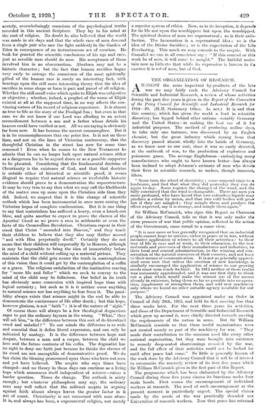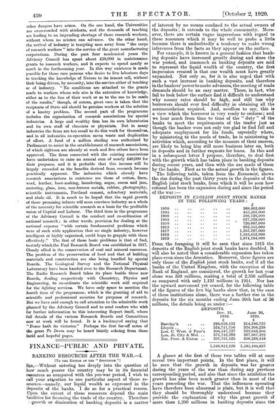THE ORGANIZATION OF RESEARCH.
AMONGST the more important by-products of the late war we may fairly rank the Advisory Council for Scientific and Industrial Research, a review of whose activities during the past five years is given in the Report of the Committee of the Privy Caused for Scientific and Industrial Research for 1919-20. (HM. Stationery Office, Is. net.) It is sad that this country, which has given the world a lead in scientific discoliery, has lagged behind other nations—notably Germany and the United States—in making the beet use of it for industrial purposes. The method of producing aniline dyes, to take only one instance, was discovered by an English chemist, but the great industry which sprang from that discovery passed almost. wholly into the hands of Germany, as we know now to our cost, since it was so easily diverted, at the outbreak of war, to the production of explosives and poisonous gases. Tho average Englishman—embodying many manufacturers who ought to have known better—has always hems inclined to adopt Johnson's estimate of men who devote their lives to scientific research, as uselms, though innocent, idlers.
" Some turn the wheel of electricity ; some suspend rings to a loadstone, and find that what they did yesterday they can do again to-day. Some register the changes of the wind, and die fully convinced that the wind is changeable. There are mon yet more profound, who have heard that two colourless liquids may produce a colour by union, and that two cold bodies will grow hot if they are mingled ; they mingle them and produce the effect expected, say it is strange, and mingle them again."
Sir William McCormick, who signs this Report as Chairman of the Advisory Council, tells us that it was only under the stern pressure of war that public opinion, reflected in the action of the Government, came round to a saner view.
"It is now more or loss generally recognized that an industrial people cannot hope to survive, either in peace or in war, without intensive application of science to all their activities to their way of life in ease and at work, to their education, to the raw materials and processes of their manufactures and industries, to their local and central administration, to tho winning and con- servation of the natural resources of their country, and not least to their moans of communication. It is not so generally appreci- ated even now that unless the creation of now knowledge is similarly encouraged the application of science to our growing needs must soon reach its limit. In 1915 neither of these truths was commonly apprehended, and it was our first duty to think out a plan which would make the utmost use of the means already in existence, bring them as far as possible into co-opens- tion, supplement or strengthen them, and add new machinery only where we found no other suitable agency available for our purpose."
Tho Advisory Council was appointed under an Order in Council of July 28th, 1915, and held its first meeting less than three weeks later. For the next three years its activities, and those of the Department of Scientific and Industrial Research which grew up around it, were chiefly directed towards meeting the requirements of the nation in arms. But Sir William McCormick reminds us that these useful organizations were not created merely as part of the machinery for war. " They made their contribution to the common need like every other national organization, but they were brought into existence to remedy deep-seated shortcomings revealed by the war, and the full effect of their activities could not be looked for until after peace had come." So little is generally known of the Work done by the Advisory Council that it will be of interest to summarize the masterly review of its first five years which Sir William McCormick gives in the first part of this Report.
The programme which has been elaborated by the Advisory Council during these five years classes its functions under four main heads. First comes the encouragement of individual workers at research. The need of such encouragement at the present moment is particularly urgent. The special claims made by the needs of the war practically denuded our Universities of research workers. Now that peace has returned other dangers have arisen. On the one hand, the Universities are overcrowded with students, and the demands of teaching are leading to an impending shortage of those research workers, without whom no science can advance. On the other hand, the revival of industry is tempting men away from " the corps of research workers " into the service of the great manufacturing corporations. During the past four academical years the Advisory Council has spent about £50,000 in maintenance grants to research workers, and it expects to spend nearly as much in the forthcoming year. In this way existence is made possible for those rare persons who desire to live laborious days in tracking the knowledge of Nature to its inmost cell, without their being driven, by necessity, into the service either of teaching or of industry. " No conditions are attached to the grants made to workers whose sole aim is the extension of knowledge, either as to the line of their work or as to the use to be made of the results," though, of course, great care is taken that the recipients of State aid should be genuine workers at the solution of a knotty problem. The second part of the programme includes the organization of research associations for special industries. A large and wealthy firm has its own laboratories and its own staff of chemists or physicists. But in many industries the firms are too small to do this work for themselves, and in all industries co-operation saves waste and duplication of effort. A fund of a million sterling was authorized by Parliament to assist in the establishment of research associations, of which eighteen are already at work and five others have been approved. The firms connected with the existing associations have undertaken to raise an annual sum of nearly £40,000 for their purposes, and it is probable that this income will be largely exceeded as the benefits derived from research become practically apparent. The industries which already have research associations in existence are those of cotton, linen, wool, leather, boot-making, laundering, sugar, cocoa and jam, motoring, glass, iron, non-ferrous metals, rubber, photography, scientific instruments, Portland cement, refractory materials, and shale oil. It is much to be hoped that the rapid growth of these promising infants will soon convince industry as a whole of the necessity for scientific research as a basis for the profitable union of Capital and Labour. The third item in the programme of the Advisory Council is the conduct and co-ordination of national research ; in other words, provision for dealing at the national expense "with certain fundamental problems which were of such wide application that no single industry, however intelligent or highly organized, could hope to grapple with them effectively." Tho first of these basic problems is that of fuel, to study which the Fuel Research Board was established in 1917. Closely allied is the conservation of coal and mineral resources. The problem of the preservation of food and that of building materials and construction are also being handled by special Boards. The Geological Survey and the National Physical Laboratory have been handed over to the Research Department. The Radio Research Board takes its place beside three new Boards, dealing respectively with Chemistry, Physics and Engineering, to co-ordinate the scientific work still required for the lighting services. We have only space to mention the fourth item of the programme, which is the granting of aid to scientific and professional societies for purposes of research. But we have said enough to call attention to the admirable work planned by the Advisory Council and to send readers who wish for further information to this interesting Report itself, where full details of the various Research Boards and Committees now at work will be found. It is a hackneyed saying that "Peace hath its victories." Perhaps the first far-off notes of the great Ts Deem may be heard faintly echoing from these lucid and hopeful pages.



































 Previous page
Previous page